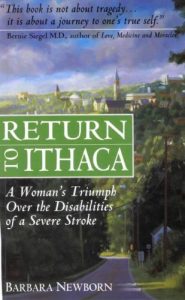At the age of 21, just graduating from college, I was planning to teach English and speech, and to marry the man of my dreams. Instead, I suffered a severe stroke. Suddenly, I had lost my ability to think and express myself in words, and my body was immobilized. The loss of language devastated me, obliterating my relationship with others and myself. I lost my connection with everything and everyone. In time I would forget myself, because I did not have any words to remind me who I was.
Recovery required a reconstruction of my entire self-image and worth. It was frightening, but I knew I had to adapt to chaotic new situations using a whole new set of rules. My loss of language was not like a broken arm or an attack of appendicitis. It took my whole being, and a new person had to evolve for healing. At first, my motivation was to regain my old self; I neither wanted to know nor would accept that I was disabled. My need to connect with these people was paramount in my healing. No matter what my fears were, I was determined to communicate in any way that 1 could—with or without speech.
Return To Ithaca, is not just about my own struggles and triumphs, it is also about anyone who has gone through a physical crisis and finds himself alone. An understanding of what the survivor is going through can lead to greater acceptance of our fellow human beings, and of our selves as well.
Basic to all healing is the potential for self-discovery - for finding out who we really are. This recovery takes tremendous perseverance, courage and faith. The healing process, though slow and painful, often provides a rare opportunity for all individuals to evolve a profound awareness. The situation does not have to remain tragic; a new consciousness can develop instead for everyone who has gone through a life-altering crisis. This tragedy can transform into an adventure journey, where discovery takes place and opens the way to psychological and spiritual growth.
This book is intended to provide insights into the turmoil, anguish, triumph and hope in the struggle for healing, but it is not limited to the stroke experience. It will speak to anyone who has faced, or is facing, adversity and loss. It also challenges many of today’s traditional definitions of disability and illness, offering new perspectives and showing that personal disability need not be a permanent change for the worse. Disability can teach us about ourselves, bringing into view what is truly important to our personal survival. It enlightens us to observe a new reality in better ways. When forced into an isolated space, one can appreciate one’s new self in a new world, making a personal transformation from the external world of appearances into the internal universe of balance, self-worth and faith. After the catastrophic storm there is a rainbow, but one must learn how and where to look for it.
Recovery required a reconstruction of my entire self-image and worth. It was frightening, but I knew I had to adapt to chaotic new situations using a whole new set of rules. My loss of language was not like a broken arm or an attack of appendicitis. It took my whole being, and a new person had to evolve for healing. At first, my motivation was to regain my old self; I neither wanted to know nor would accept that I was disabled. My need to connect with these people was paramount in my healing. No matter what my fears were, I was determined to communicate in any way that 1 could—with or without speech.
Return To Ithaca, is not just about my own struggles and triumphs, it is also about anyone who has gone through a physical crisis and finds himself alone. An understanding of what the survivor is going through can lead to greater acceptance of our fellow human beings, and of our selves as well.
Basic to all healing is the potential for self-discovery - for finding out who we really are. This recovery takes tremendous perseverance, courage and faith. The healing process, though slow and painful, often provides a rare opportunity for all individuals to evolve a profound awareness. The situation does not have to remain tragic; a new consciousness can develop instead for everyone who has gone through a life-altering crisis. This tragedy can transform into an adventure journey, where discovery takes place and opens the way to psychological and spiritual growth.
This book is intended to provide insights into the turmoil, anguish, triumph and hope in the struggle for healing, but it is not limited to the stroke experience. It will speak to anyone who has faced, or is facing, adversity and loss. It also challenges many of today’s traditional definitions of disability and illness, offering new perspectives and showing that personal disability need not be a permanent change for the worse. Disability can teach us about ourselves, bringing into view what is truly important to our personal survival. It enlightens us to observe a new reality in better ways. When forced into an isolated space, one can appreciate one’s new self in a new world, making a personal transformation from the external world of appearances into the internal universe of balance, self-worth and faith. After the catastrophic storm there is a rainbow, but one must learn how and where to look for it.






